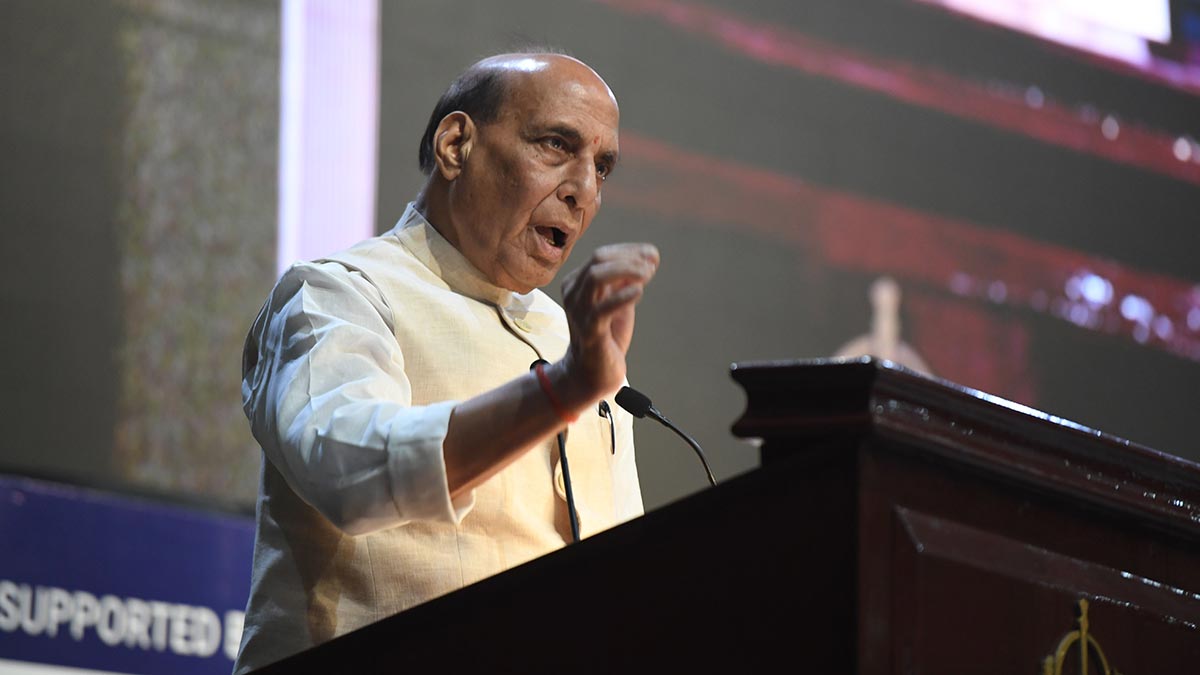
Introduction to India’s Strong Stance Against Terrorism
India’s Defence Minister, Rajnath Singh, has issued a resolute warning to Pakistan, asserting that any future terror attack on Indian soil will exact a heavy toll. This statement, delivered in the context of Operation Sindoor, underscores India’s unyielding commitment to combating terrorism.
Operation Sindoor: A Continuing Mission
Background of Operation Sindoor
Operation Sindoor is an ongoing counter-terrorism initiative designed to neutralize threats originating from across the border, particularly from Pakistan. Rajnath Singh emphasized that this operation is far from concluded, highlighting the effort of sustained vigilance. Launched in response to recent terror incidents, the operation targets terrorist networks and their sponsors, ensuring India’s sovereignty remains uncompromised.
Key Objectives of the Operation
- Eliminate Terror Networks: Disrupting terrorist infrastructure through coordinated efforts with intelligence agencies.
- Deter Future Attacks: Sending a unequivocal message to hostile entities about the repercussions of aggression.
- Strengthen Border Security: Enhancing surveillance, deploying advanced technology, and increasing military presence along sensitive borders.
- Community Engagement: Encouraging local communities to report suspicious activities to bolster grassroots intelligence.
Rajnath Singh’s Statement: A Message of Strength
Context of the Warning
During a recent address, Rajnath Singh directly addressed Pakistan’s alleged role in sponsoring terrorism, stating, “Any terror attack on Indian soil will prove heavy on Pakistan.” This warning comes in the wake of incidents like the Pahalgam attack, which have heightened regional tensions. The focus here is accountability, ensuring that Pakistan faces severe consequences for any hostile actions.
Implications for Pakistan
Rajnath Singh’s remarks serve as a powerful deterrent, with the focus being the high cost Pakistan would incur for supporting terrorism. Potential consequences include:
- Diplomatic Repercussions: Increased international isolation and pressure to dismantle terror networks.
- Military Response: Swift, precise, and proportionate counterstrikes targeting terrorist bases.
- Economic Consequences: Strained bilateral relations, impacting trade and economic cooperation.
- Global Scrutiny: Heightened monitoring by international bodies like the Financial Action Task Force (FATF) for terror financing.
India’s Broader Counter-Terrorism Strategy
Strengthening National Security
India has adopted a comprehensive approach to counter terrorism. Key measures include:
- Modernizing Armed Forces: Equipping the military with cutting-edge technology, including drones and cyber warfare tools.
- Intelligence Sharing: Strengthening collaboration with global partners to track and disrupt terror networks.
- Public Awareness Campaigns: Educating citizens to recognize and report suspicious activities, fostering a sense of collective responsibility.
- Border Infrastructure Development: Upgrading infrastructure along the Line of Control (LoC) to prevent infiltration.
International Cooperation
Rajnath Singh’s recent discussions with his U.S. counterpart highlighted Pakistan’s role in regional instability, reinforcing the focus of global accountability. India is advocating for a united international front against state-sponsored terrorism, urging nations to holdPakistan accountable for its actions. This includes:
- Bilateral Agreements: Strengthening defense and intelligence-sharing pacts with allies.
- Multilateral Forums: Raising the issue at platforms like the United Nations to garner global support.
- Sanctions Advocacy: Pushing for stricter measures against entities supporting terrorism.
Public and Political Reactions
Domestic Support
The Indian public has overwhelmingly supported Rajnath Singh’s tough stance, with the focus being national unity in the face of terrorism. Posts on X reflect a strong public sentiment favoring a hardline approach, with hashtags like #IndiaAgainstTerror trending. Political parties across the spectrum have also expressed solidarity, emphasizing the need for a united front.
International Perspective
Globally, Rajnath Singh’s statement has sparked discussions about the need for decisive action against terrorism. Analysts on X and international media have noted India’s growing assertiveness, with the focus being the international community’s role in addressing Pakistan’s actions. Countries like the U.S. and France have echoed India’s concerns, calling for stricter measures against terror financing.
Historical Context of India-Pakistan Tensions
Past Incidents and Responses
India-Pakistan relations have been strained by several high-profile terror attacks, including the 2008 Mumbai attacks and the 2019 Pulwama attack. In each case, India responded with diplomatic and military measures, such as the 2016 surgical strikes and the 2019 Balakot airstrike. The focus here is India’s consistent policy of responding firmly to provocations.
Lessons Learned
These incidents have shaped India’s current strategy, with the focus being preparedness and deterrence. The government has invested heavily in intelligence-gathering and rapid-response mechanisms to prevent future attacks.
Future Outlook: Ensuring Lasting Peace
India’s Commitment to Peace
While Rajnath Singh’s warning is firm, India remains committed to peace in the region. The focus is balancing deterrence with diplomacy, ensuring that Pakistan understands the consequences of its actions while keeping channels open for dialogue.
Challenges Ahead
- Cross-Border Infiltration: Continued attempts by terror groups to infiltrate Indian territory.
- Geopolitical Dynamics: Balancing relations with other regional players like China and Afghanistan.
- Internal Security: Addressing potential radicalization within vulnerable communities.
A Resolute Path Forward
Rajnath Singh’s warning to Pakistan reinforces India’s zero-tolerance policy toward terrorism. With Operation Sindoor still active, the focus remains on deterring future attacks and holding perpetrators accountable. India’s multi-faceted approach—combining military readiness, international cooperation, and public support—sends a clear message: any act of aggression will come at a steep price. The focus of this strategy is to ensure a secure and peaceful future for India while maintaining pressure on Pakistan to abandon its support for terrorism.








